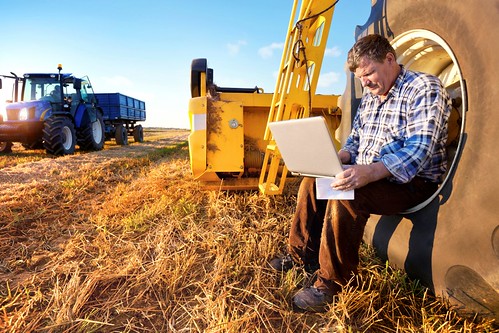
Organic farmer on his computer accessing information regarding climate conditions. USDA photo
All this month we will be taking a look at what a changing climate means to Agriculture. The ten regional USDA Climate Hubs were established to synthesize and translate climate science and research into easily understood products and tools that land managers can use to make climate-informed decisions. The Hubs work at the regional level with an extensive network of trusted USDA agency partners, technical service providers, University collaborators, and private sector advisers to ensure they have the information they need to respond to producers that are dealing with the effects of a variable climate. USDA’s Climate Hubs are part of our broad commitment to developing the next generation of climate solutions, so that our agricultural leaders have the modern technologies and tools they need to adapt and succeed in the face of a changing climate.
In the Northeast and Midwest U.S., a changing climate is expected to continue impacting agriculture for the foreseeable future. From Minnesota to Maine and Maryland to Missouri, increasingly severe weather, variable temperatures, and at times droughty soil conditions are exacerbating the existing challenge of managing productive lands without degrading natural resources. To help farmers adjust their practices or even transform their operations (“adapt”) to meet these challenges, the USDA Northeast, Midwest, and Northern Forests Climate Hubs collaborated to develop “Adaptation Resources for Agriculture,” a compilation of information about climate change considerations and responses. Authors from the U.S. Forest Service, Natural Resources Conservation Service, and the Agricultural Research Service teamed up to review climate change literature and develop easy to understand guidance for on-farm decision-making.
“Adaptation Resources for Agriculture” includes a regional summary of climate change effects on agriculture, a compilation of adaptation strategies and approaches, and a workbook to identify farm specific response options leading to flexible adaptive actions. The workbook is intended for use in a small workshop setting to enable farmer engagement in understanding how climate change impacts their enterprise and natural resources and how to respond for the benefit of current and future generations.
Based upon the “Forest Adaptation Resources” developed by the U.S. Forest Service and Northern Institute of Applied Climate Science in 2012 and Adaptation Workbook demonstrations completed by hundreds of users across a wide variety of projects on public and private lands, “Adaptation Resources for Agriculture” has been developed specifically to meet the unique needs of agricultural producers. Many climate science concepts apply to both agriculture and forestry anywhere in the nation, including sustaining the fundamental functions of soil and water resources, reducing the impacts of biological stressors or extreme weather, and managing the enterprise as part of a larger landscape.
In each region, agricultural producers will experience different types and degrees of climate change effects depending on their site specific conditions and capacity to cope with impacts or to take advantage of opportunities. For example, the Midwest and the Northeast have experienced a significant increase in extreme precipitation since the mid-1900’s resulting in delayed planting, increased soil erosion, loss of nutrients, flood damage, and resulting increases in expenses or decrease in yields. Three examples of typical farms in the region highlighted in the publication: corn and soybean production in Iowa; beef grazing in Missouri; and confined dairy in Pennsylvania, demonstrate how an adaptation perspective helps farmers overcome ever increasing challenges of climate change, as well as take advantage of possible opportunities.
The publication is intended to serve as a template for other regions to create adaptation strategies and approaches relevant to their expected climate change conditions and typical agricultural commodities. It is currently under review and scheduled for public release later this year. Several workshops are planned to introduce “Adaptation Resources for Agriculture” to educators, conservationists and producers, including a session at the Soil and Water Conservation Society annual conference in Louisville, KY in July and the National Small Farms Conference in Virginia in September.
Whether you’re able to attend these workshops or not, you can discover more updates like this from the Northeast Climate Hub by signing-up for their quarterly newsletter and by following them on Twitter at @USDAClimateHubs. Additionally, please mark your calendar for June 1st at 2pm EST to catch their next webinar, Emerging Manure to Energy Technologies – Are Cost Effective Small Scale Digesters Possible?
No comments:
Post a Comment
Note: Only a member of this blog may post a comment.